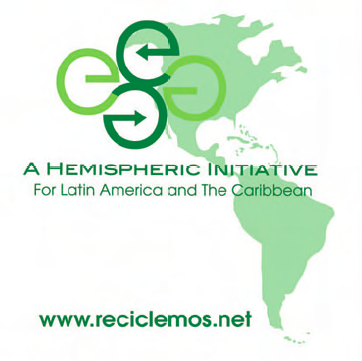
As the world becomes more technologically savvy, with new-and-improved products hitting the market every day, the amount of electronic waste we create becomes an ever-increasing issue.
Developing countries are the ones most affected by e-waste, given the absence of information and awareness about the impacts of this waste. In Latin America and the Caribbean, very little of the produced e-waste is treated in a sustainable manner. That’s why
We Recycle (aka Recicle Mos) was created.
We Recycle was created in 2007 to educate the people of Latin America and the Caribbean about e-waste. Of course, electronic equipment contains toxic substances in its components, so e-waste must be recycled responsibly to limit the impacts to human health and the environment.
A few substances of concern:
- Polychlorinated Biphenyl (PCB): PCB can be present in condensers and transformers of old electronic equipment.
- Health concerns: Exposure can cause anemia and damages to the skin, liver, stomach and thyroid.
- Environmental concerns: This chemical compound could drip through subsurface layers, reaching water and contaminating it if buried in landfills. Because it is poorly soluble, it is very dangerous when it enters water currents, as it could contaminate the chain of production of some foods.
- Tetrabromobisphenol A (TBBPA): TBBPA Is a flame retardant that is used in computer motherboards. This compound represents 50% of all brominated flame retardants produced worldwide and 96% of all motherboards use this chemical compound.
- Health concerns: Exposure can interfere in the transport and metabolism of some hormones and is toxic to aquatic organisms.
- Environmental concerns: It’s biodegradable, but one of the products of this biodegradation is bisphenol, which can cause damages to the endocrine system.
- Cadmium: Cadmium is a heavy metal included in many electronic components, such as contact plates and switches, and it is used to prevent corrosion. It is added as a plastic stabilizer and pigment to wiring, motherboards, PCs, monitors and printed circuit boards.
- Health concerns: Exposure can cause damage to the central nervous system and immune system, as well as psychological disorders and possible cancer development.
- Environmental concerns: Low concentrations can cause alterations in the ecology and balance of soil nutrients. This metal can bio-accumulate in mushrooms, oysters, shrimp, mussels and fish.
Some of the challenges We Recycle tries to overcome in Latin America and the Caribbean are the lack of awareness and information about e-waste disposal, the absence of laws and policies that would define manufacturers’ responsibility and the need for recollection/takeback campaigns.
In Latin America and the Caribbean, Internet usage increased by 371% between 2000 and 2005, and more than half of the population had cell phones in 2005. E-waste is a growing problem, so it is encouraging that an organization like We Recycle is at the forefront making a positive impact.
 As the world becomes more technologically savvy, with new-and-improved products hitting the market every day, the amount of electronic waste we create becomes an ever-increasing issue.
Developing countries are the ones most affected by e-waste, given the absence of information and awareness about the impacts of this waste. In Latin America and the Caribbean, very little of the produced e-waste is treated in a sustainable manner. That’s why We Recycle (aka Recicle Mos) was created.
We Recycle was created in 2007 to educate the people of Latin America and the Caribbean about e-waste. Of course, electronic equipment contains toxic substances in its components, so e-waste must be recycled responsibly to limit the impacts to human health and the environment.
A few substances of concern:
As the world becomes more technologically savvy, with new-and-improved products hitting the market every day, the amount of electronic waste we create becomes an ever-increasing issue.
Developing countries are the ones most affected by e-waste, given the absence of information and awareness about the impacts of this waste. In Latin America and the Caribbean, very little of the produced e-waste is treated in a sustainable manner. That’s why We Recycle (aka Recicle Mos) was created.
We Recycle was created in 2007 to educate the people of Latin America and the Caribbean about e-waste. Of course, electronic equipment contains toxic substances in its components, so e-waste must be recycled responsibly to limit the impacts to human health and the environment.
A few substances of concern: